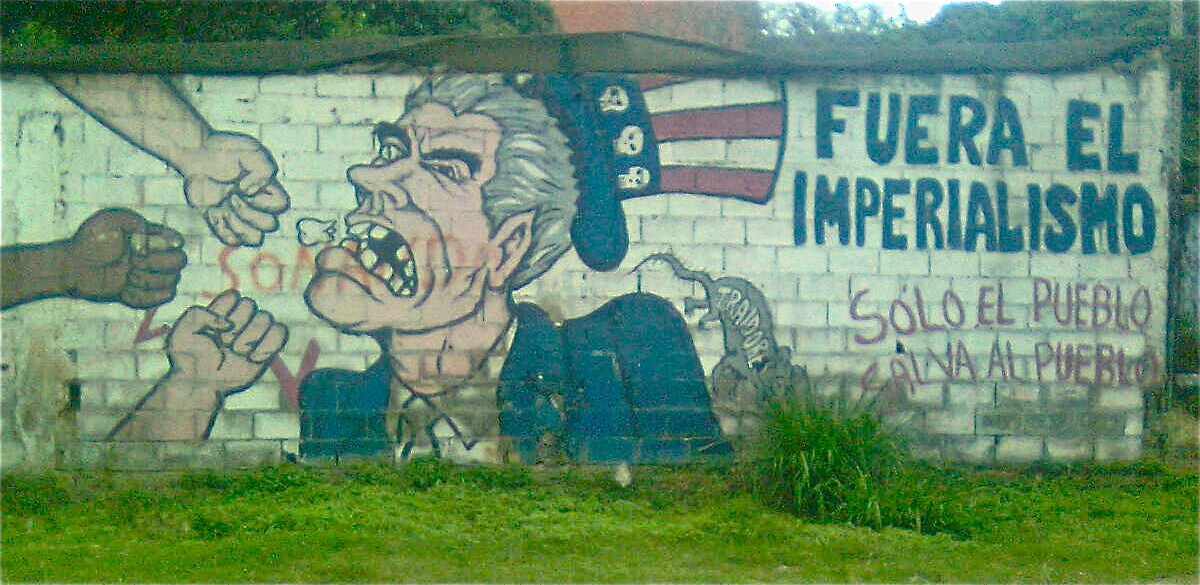
反帝国主義
Anti-imperialism
Anti-imperialist
painting in Caracas, specifically targeting American imperialism.
Written in Spanish "Out with imperialism, only the people save the
people"
☆ 政治学および国際関係論における反帝国主義(Anti-imperialism) とは、帝国主義または新植民地主義への反対を意味する。反帝国主義的な感情は、一般的に、世界的な超大国による介入や影響力に対抗する独立闘争において、 また植民地支配への反対運動において、政治的原則として現れる。反帝国主義は、レーニン主義による帝国主義の解釈(より高い利益を求めて発展途上国に輸出 される剰余価値に関するウラジーミル・レーニンの理論、最終的には帝国主義につながる)のような特定の経済理論から生じることもある。これは、レーニンの 1917年の著作『帝国主義、資本主義の最高段階』に由来する。反帝国主義者と自らを分類する人々は、植民地主義、植民地帝国、覇権主義、帝国主義、およ び確立された国境を越えた領土拡張に反対していると主張することが多い。 西洋左派とは独立した影響力のある運動で、宗教的反帝国主義を提唱したのは汎イスラム主義であった。これは西洋の文明モデルに異議を唱え、19世紀から 20世紀にかけてイスラム世界のさまざまな地域で注目を集めた。最も影響力を持った思想家は、スンナ派の神学者ムハンマド・ラシード・リダ(Rashid Rida) であり、西洋の思想の強烈な反対者であった。彼は、イスラム教徒に対して帝国主義に対してジハードを戦い、イスラム教カリフ制を再確立するために武装抵抗 を起こすよう呼びかけた。コミンテルン第2回大会(1920年)における決議を通じて、レーニンは汎イスラム主義者の反帝国主義がブルジョワ、封建地主、 宗教聖職者の利益を優先していると非難し、共産主義者たちに汎イスラム主義と強制的に戦うよう扇動した。それ以来、ソビエト当局は反ソビエト活動や反共産 主義的暴動を扇動したとして、イスラム教徒の反体制派を標的にするために、汎イスラム主義という非難を定期的に用いた。 この言葉は、第二次世界大戦後、そして冷戦の始まりとともに、ヨーロッパ列強の植民地における政治運動が国家主権を推進する中で、広く普及するようになっ た。米国に反対する反帝国主義グループの中にはソビエト連邦の権力を支持するものもあったが、一方で、毛沢東主義などのマルクス主義の学派の中には、これ を社会帝国主義として批判するものもあった。イスラム主義運動は伝統的に、米国やイスラエルなどの同盟国に加え、ロシアや中国を帝国主義的で新植民地主義 的な勢力と見なし、国内および国外のイスラム教徒のコミュニティに対する迫害や弾圧を行っているとみなしている。[9]
| Anti-imperialism in
political science and international relations is opposition to
imperialism or neocolonialism. Anti-imperialist sentiment typically
manifests as a political principle in independence struggles against
intervention or influence from a global superpower, as well as in
opposition to colonial rule. Anti-imperialism can also arise from a
specific economic theory, such as in the Leninist interpretation of
imperialism (Vladimir Lenin's theory of surplus value being exported to
less developed nations in search of higher profits, eventually leading
to imperialism), which is derived from Lenin's 1917 work Imperialism,
the Highest Stage of Capitalism. People who categorize themselves as
anti-imperialists often state that they are opposed to colonialism,
colonial empires, hegemony, imperialism and the territorial expansion
of a country beyond its established borders.[1] An influential movement independent of the Western left that advocated religious anti-imperialism was pan-Islamism; which challenged the Western civilisational model and rose to prominence across various parts of the Islamic world during the 19th and 20th centuries. Its most influential ideologue was the Sunni theologian Muhammad Rashid Rida, a fierce opponent of Western ideas, who called upon Muslims to rise up in armed resistance by waging jihad against imperialism and re-establish an Islamic caliphate.[2][3][4][5][6] Through his resolution in the Second World Congress of Comintern (1920), Lenin accused the anti-imperialism of pan-Islamists of favouring the interests of the bourgeoisie, feudal landlords and religious clerics; and incited communists to compulsorily fight pan-Islamism. Since then, Soviet authorities regularly employed the charge of pan-Islamism to target Islamic dissidents for anti-Soviet activities and fomenting anti-communist rebellions.[7][8] The phrase gained a wide currency after the Second World War and at the onset of the Cold War as political movements in colonies of European powers promoted national sovereignty. Some anti-imperialist groups who opposed the United States supported the power of the Soviet Union, while in some Marxist schools, such as Maoism, this was criticized as social imperialism. Islamist movements traditionally view Russia and China as imperial and neo-colonial forces engaged in persecution and oppression of Muslim communities domestically and abroad, in addition to the U.S. and its allies like Israel.[9] |
政治学および国際関係論における反帝国主義とは、帝国主義または新植民
地主義への反対を意味する。反帝国主義的な感情は、一般的に、世界的な超大国による介入や影響力に対抗する独立闘争において、また植民地支配への反対運動
において、政治的原則として現れる。反帝国主義は、レーニン主義による帝国主義の解釈(より高い利益を求めて発展途上国に輸出される剰余価値に関するウラ
ジーミル・レーニンの理論、最終的には帝国主義につながる)のような特定の経済理論から生じることもある。これは、レーニンの1917年の著作『帝国主
義、資本主義の最高段階』に由来する。反帝国主義者と自らを分類する人々は、植民地主義、植民地帝国、覇権主義、帝国主義、および確立された国境を越えた
領土拡張に反対していると主張することが多い。 西洋左派とは独立した影響力のある運動で、宗教的反帝国主義を提唱したのは汎イスラム主義であった。これは西洋の文明モデルに異議を唱え、19世紀から 20世紀にかけてイスラム世界のさまざまな地域で注目を集めた。最も影響力を持った思想家は、スンナ派の神学者ムハンマド・ラシード・リダであり、西洋の 思想の強烈な反対者であった。彼は、イスラム教徒に対して帝国主義に対してジハードを戦い、イスラム教カリフ制を再確立するために武装抵抗を起こすよう呼 びかけた。[2][3][4][5][6] コミンテルン第2回大会(1920年)における決議を通じて、レーニンは汎イスラム主義者の反帝国主義がブルジョワ、封建地主、宗教聖職者の利益を優先し ていると非難し、共産主義者たちに汎イスラム主義と強制的に戦うよう扇動した。それ以来、ソビエト当局は反ソビエト活動や反共産主義的暴動を扇動したとし て、イスラム教徒の反体制派を標的にするために、汎イスラム主義という非難を定期的に用いた。 この言葉は、第二次世界大戦後、そして冷戦の始まりとともに、ヨーロッパ列強の植民地における政治運動が国家主権を推進する中で、広く普及するようになっ た。米国に反対する反帝国主義グループの中にはソビエト連邦の権力を支持するものもあったが、一方で、毛沢東主義などのマルクス主義の学派の中には、これ を社会帝国主義として批判するものもあった。イスラム主義運動は伝統的に、米国やイスラエルなどの同盟国に加え、ロシアや中国を帝国主義的で新植民地主義 的な勢力と見なし、国内および国外のイスラム教徒のコミュニティに対する迫害や弾圧を行っているとみなしている。[9] |
| Theory In the late 1870s, the term "imperialism" was introduced to the English language by opponents of the aggressively imperial policies of British Prime Minister Benjamin Disraeli (1874–1880).[10] It was shortly appropriated by supporters of "imperialism" such as Joseph Chamberlain. For some, imperialism designated a policy of idealism and philanthropy; others alleged that it was characterized by political self-interest; and a growing number associated it with capitalist greed. John A. Hobson and Vladimir Lenin added a more theoretical macroeconomic connotation to the term. Many theoreticians on the left have followed either or both in emphasizing the structural or systemic character of "imperialism". Such writers have expanded the time period associated with the term so that it now designates neither a policy, nor a short space of decades in the late 19th century, but a global system extending over a period of centuries, often going back to Christopher Columbus. As the application of the term has expanded, its meaning has shifted along five distinct but often parallel axes: the moral, the economic, the systemic, the cultural and the temporal. Those changes reflect—among other shifts in sensibility—a growing unease with the fact of power, specifically Western power.[11][12] The relationships among capitalism, aristocracy and imperialism have been discussed and analysed by theoreticians, historians, political scientists such as John A. Hobson and Thorstein Veblen, Joseph Schumpeter and Norman Angell.[13] Those intellectuals produced much of their works about imperialism before the World War I (1914–1918), yet their combined work informed the study of the impact of imperialism upon Europe and contributed to the political and ideologic reflections on the rise of the military–industrial complex in the United States from the 1950s onwards.[citation needed] Hobson Main article: Imperialism (Hobson) John A. Hobson strongly influenced the anti-imperialism of both Marxists and liberals, worldwide through his 1902 book on Imperialism. He argued that the "taproot of imperialism" is not in nationalist pride, but in Capitalism. As a form of economic organization, imperialism is unnecessary and immoral, the result of the mis-distribution of wealth in a capitalist society. That created an irresistible desire to extend the national markets into foreign lands, in search of profits greater than those available in the Mother Country. In the capitalist economy, rich capitalists received a disproportionately higher income than did the working class. If the owners invested their incomes to their factories, the greatly increased productive capacity would exceed the growth in demand for the products and services of said factories. Lenin adopted Hobson's ideas to argue that capitalism was doomed and would eventually be replaced by socialism, the sooner the better.[citation needed] Hobson was also influential in liberal circles, especially the British Liberal Party.[14] Historians Peter Duignan and Lewis H. Gann argue that Hobson had an enormous influence in the early 20th century that caused widespread distrust of imperialism: Hobson's ideas were not entirely original; however his hatred of moneyed men and monopolies, his loathing of secret compacts and public bluster, fused all existing indictments of imperialism into one coherent system....His ideas influenced German nationalist opponents of the British Empire as well as French Anglophobes and Marxists; they colored the thoughts of American liberals and isolationist critics of colonialism. In days to come they were to contribute to American distrust of Western Europe and of the British Empire. Hobson helped make the British averse to the exercise of colonial rule; he provided indigenous nationalists in Asia and Africa with the ammunition to resist rule from Europe.[15] On the positive side, Hobson argued that domestic social reforms could cure the international disease of imperialism by removing its economic foundation. Hobson theorized that state intervention through taxation could boost broader consumption, create wealth and encourage a peaceful multilateral world order. Conversely, should the state not intervene, rentiers (people who earn income from property or securities) would generate socially negative wealth that fostered imperialism and protectionism.[16][17] Political movement As a self-conscious political movement, anti-imperialism originated in Europe in the late 19th and early 20th centuries in opposition to the growing European colonial empires and the United States control of the Philippines after 1898.[18] However, it reached its highest level of popular support in the colonies themselves, where it formed the basis for a wide variety of national liberation movements during the mid-20th century and later. These movements, and their anti-imperialist ideas, were instrumental in the decolonization process of the 1950s and 1960s, which saw most European colonies in Asia and Africa achieving their independence.[10] |
理論 1870年代後半、英国首相ベンジャミン・ディズレーリ(1874年~1880年)の帝国主義的強硬政策の反対派によって、「帝国主義」という用語が英語 に導入された。[10] その後まもなく、ジョゼフ・チェンバレンなどの「帝国主義」の支持者たちによって、この用語が利用されるようになった。ある人々にとっては、帝国主義は理 想主義と博愛主義の政策を意味し、またある人々は、それは政治的な自己利益によって特徴づけられると主張し、さらに、資本主義の強欲と関連付ける人も増え ていった。ジョン・A・ホブソンとウラジーミル・レーニンは、この用語に、より理論的なマクロ経済的な含みを加えた。左派の多くの理論家たちは、帝国主義 の構造的または体系的な性格を強調する上で、そのどちらか、あるいは両方を踏襲している。こうした作家たちは、この用語に関連する時代を拡大し、現在で は、政策でもなければ、19世紀後半の数十年間の短い期間でもなく、数世紀にわたる世界的なシステム、しばしばクリストファー・コロンブスにまで遡るもの として定義されている。この用語の適用範囲が広がるにつれ、その意味も5つの異なる軸に沿って変化してきた。すなわち、道徳、経済、システム、文化、時間 である。これらの変化は、感性の変化のひとつとして、特に西洋の権力という事実に対する不安の高まりを反映している。[11][12] 資本主義、貴族政治、帝国主義の関係については、ジョン・A・ホブソンやトールステイン・ヴェブレン、ジョセフ・シュンペーター、ノーマン・アンジェルと いった理論家、歴史家、政治学者によって議論や分析が行われてきた。[13] これらの知識人は、その作品の多くを第一次世界大戦(1914年~1918年)前に帝国主義について執筆したが、彼らの研究は、帝国主義がヨーロッパに与 えた影響の研究に役立ち、1950年代以降のアメリカにおける軍産複合体の台頭に関する政治的・イデオロギー的な考察に貢献した。彼らの著作は、帝国主義 がヨーロッパに与えた影響の研究に多大な影響を与え、1950年代以降のアメリカにおける軍産複合体の台頭に関する政治的・イデオロギー的な考察にも貢献 した。 ホブソン 詳細は「帝国主義 (ホブソン)」を参照 ジョン・A・ホブソンは、1902年に出版した『帝国主義』によって、マルクス主義者と自由主義者の双方の反帝国主義に強い影響を与えた。彼は、「帝国主 義の根源」は民族主義的誇りではなく、資本主義にあると主張した。経済組織の形態として、帝国主義は不必要かつ不道徳であり、資本主義社会における富の不 適切な分配の結果である。それは、本国よりも大きな利益を求めて、自国の市場を外国に拡大したいという強い欲求を生み出した。資本主義経済では、裕福な資 本家は労働者階級よりもはるかに高い収入を得ていた。もし工場主がその収入を工場に投資すれば、生産能力は大幅に増加するが、その工場の製品やサービスに 対する需要の増加を上回るだろう。レーニンはホブソンの考えを取り入れ、資本主義は破滅的であり、いずれ社会主義に取って代わられるだろうと主張した。 ホブソンは自由主義者の間でも影響力があり、特にイギリスの自由党で影響力があった。[14] 歴史家のピーター・ドゥイーガンとルイス・H・ガンは、ホブソンは20世紀初頭に帝国主義に対する広範な不信感を生み出すほどの大きな影響力を持っていたと主張している。 ホブソンの思想は完全に独創的なものではなかったが、金持ちや独占企業に対する彼の憎悪、秘密協定や公の場での虚勢に対する嫌悪は、帝国主義に対する既存 の告発をすべてひとつの首尾一貫した体系に融合させた。彼の思想は、大英帝国のドイツ民族主義的反対派だけでなく、フランス人の英国嫌いやマルクス主義者 にも影響を与えた。また、アメリカの自由主義者や植民地主義の孤立主義的批判者の考えにも影響を与えた。やがて、それらの考えはアメリカにおける西ヨー ロッパと大英帝国への不信感に貢献することとなった。ホブソンは、イギリスが植民地支配を行うことに嫌悪感を抱くよう後押しし、アジアやアフリカの土着の 民族主義者たちにヨーロッパからの支配に抵抗するための弾薬を提供した。 一方でホブソンは、国内の社会改革によって帝国主義の経済的基盤を除去し、国際的な病弊を治癒できると主張した。ホブソンは、課税による国家の介入はより 幅広い消費を促進し、富を生み出し、平和的な多国間世界秩序を奨励できると理論化した。逆に国家が介入しなければ、レントシー(不動産や証券から収入を得 る人々)が社会的に否定的な富を生み出し、帝国主義と保護主義を助長することになるだろうと述べた。[16][17] 政治運動 自覚的な政治運動として、反帝国主義は19世紀後半から20世紀初頭にかけてヨーロッパで、拡大するヨーロッパの植民地帝国と、1898年以降のアメリカ 合衆国のフィリピン支配に反対する形で始まった。[18] しかし、植民地自体で最も高い支持を得たのは、20世紀半ば以降のさまざまな民族解放運動の基盤となった。これらの運動と反帝国主義の思想は、1950年 代と1960年代の脱植民地化プロセスにおいて重要な役割を果たし、アジアとアフリカのほとんどのヨーロッパ植民地が独立を達成した。[10] |
| International context United States Main article: American Anti-Imperialist League An early use of the term "anti-imperialist" occurred after the United States entered the Spanish–American War in 1898.[19] Most activists supported the war itself, but opposed the annexation of new territory, especially the Philippines.[20] The Anti-Imperialist League was founded on June 15, 1898, in Boston in opposition of the acquisition of the Philippines, which would happen anyway. The anti-imperialists opposed the expansion because they believed imperialism violated the credo of republicanism, especially the need for "consent of the governed". Appalled by American imperialism, the Anti-Imperialist League, which included famous citizens such as Andrew Carnegie, Henry James, William James and Mark Twain, formed a platform which stated: We hold that the policy known as imperialism is hostile to liberty and tends toward militarism, an evil from which it has been our glory to be free. We regret that it has become necessary in the land of Washington and Lincoln to reaffirm that all men, of whatever race or color, are entitled to life, liberty and the pursuit of happiness. We maintain that governments derive their just powers from the consent of the governed. We insist that the subjugation of any people is "criminal aggression" and open disloyalty to the distinctive principles of our Government... We cordially invite the cooperation of all men and women who remain loyal to the Declaration of Independence and the Constitution of the United States.[21] Fred Harrington states that "the anti-imperialist's did not oppose expansion because of commercial, religious, constitutional, or humanitarian reasons but instead because they thought that an imperialist policy ran counter to the political doctrines of the Declaration of Independence, Washington's Farewell Address, and Lincoln's Gettysburg Address".[22][23][24] An important influence on American intellectuals was the work of British writer John A. Hobson. especially Imperialism: A Study (1902). Historians Peter Duignan and Lewis H. Gann argue that Hobson had an enormous influence in the early 20th century that caused widespread distrust of imperialism: Hobson's ...hatred of moneyed men and monopolies, his loathing of secret compacts and public bluster, fused all existing indictments of imperialism into one coherent system....His ideas influenced German nationalist opponents of the British Empire as well as French Anglophobes and Marxists; they colored the thoughts of American liberals and isolationist critics of colonialism. In days to come they were to contribute to American distrust of Western Europe and of the British Empire. Hobson helped make the British averse to the exercise of colonial rule; he provided indigenous nationalists in Asia and Africa with the ammunition to resist rule from Europe.[15] The American rejection of the League of Nations in 1919 was accompanied with a sharp American reaction against European imperialism. American textbooks denounced imperialism as a major cause of the World War. The uglier aspects of British colonial rule were emphasized, recalling the long-standing anti-British sentiments in the United States.[25] In Britain and Canada Anti-imperialism within Britain emerged in the 1890s, especially from within the Liberal Party. For over a century, back to the days of Adam Smith in 1776, economists had been hostile to imperialism on the grounds that it is a violation of the principles of free trade; they never formed a popular movement. Indeed, imperialism seems to have been generally popular before the 1890s.[26] The key impetus around 1900 came from strong public disapproval with the British actions during with the Second Boer War (1899–1902). The war was fought against the Afrikaners, who were Dutch colonists who had built new homelands in South Africa. Opposition to the Second Boer War was modest when the war began and was generally less widespread than support for it. However, influential groups formed immediately against the war, including the South African Conciliation Committee and W. T. Stead's Stop the War Committee. Much of the opposition in Britain came from the Liberal Party. Intellectuals and activists Britain based in the socialist, labour and Fabian movements generally oppose imperialism and John A. Hobson, a Liberal, took many of his ideas from their writings.[27] After the Boer war, opponents of imperialism turned their attention to the British crown colonies in Africa and Asia.[28] By the 1920s, the government was sponsoring large-scale exhibits promoting imperialism, notably the 1924 British Empire Exhibition in London and the 1938 Glasgow Empire Exhibition. Some intellectuals used the opportunity to criticise imperialism as a policy.[29] Moderately active anti-imperial movements emerged in Canada and Australia. The French Canadians were hostile to British expansion whilst in Australia, it was the Irish Catholics who were opposed.[30] French Canadians argue that Canadian nationalism was the proper and true goal and it sometimes conflicted with loyalty to the British Empire. Many French Canadians claimed that they would fight for Canada but would not fight for the Empire.[31] Protestant Canadians, typically of British descent, generally supported British imperialism enthusiastically. They sent thousands of volunteers to fight alongside British and imperial forces against the Boers and in the process identified themselves even more strongly with the British Empire.[32] A little opposition also came from some English immigrants such as the intellectual leader Goldwin Smith.[33] In Canada, the Irish Catholics were fighting the French Canadians for control of the Catholic Church, so the Irish generally supported the pro-British position.[34] Anti-imperialism also grew rapidly in India and formed a core element of the demand by Congress for independence.[citation needed] |
国際的文脈 アメリカ合衆国 詳細は「アメリカ反帝国主義同盟」を参照 「反帝国主義者」という用語が最初に用いられたのは、1898年にアメリカが米西戦争に参戦した後であった。[19] ほとんどの活動家は戦争自体は支持したが、新たな領土の併合、特にフィリピンへの領土拡大には反対した。[20] 反帝国主義者同盟は、いずれにせよ起こるであろうフィリピン領有に反対して、1898年6月15日にボストンで結成された。反帝国主義者たちは、帝国主義 が共和制の信条、特に「統治される者の同意」の必要性を侵害すると信じていたため、その拡大に反対した。アメリカ帝国主義に憤慨した反帝国主義同盟は、ア ンドリュー・カーネギー、ヘンリー・ジェイムズ、ウィリアム・ジェイムズ、マーク・トウェインといった著名な市民を含み、次のような綱領を掲げた。 我々は、帝国主義として知られる政策は自由の敵であり、軍国主義へと向かうものであると考える。軍国主義は、我々が自由であることを誇りとしてきた悪であ る。我々は、ワシントンやリンカーンの国において、人種や肌の色に関わらず、すべての人間が生命、自由、幸福の追求の権利を有していることを再確認する必 要が生じたことを遺憾に思う。我々は、政府は統治される者の同意から正当な権力を得るものであると主張する。我々は、いかなる民族の征服も「犯罪的な侵 略」であり、我々の政府の特別な原則に対する公然たる背信行為であると主張する。我々は、独立宣言と合衆国憲法に忠誠を誓うすべての人々の協力を心から歓 迎する。[21] フレッド・ハリントンは、「反帝国主義者たちが領土拡張に反対したのは、商業、宗教、憲法、人道上の理由からではなく、帝国主義政策が独立宣言、ワシント ンの退任演説、リンカーンのゲティスバーグ演説の政治的教義に反すると考えたからだ」と述べている。[22][23][24] アメリカの知識人に大きな影響を与えたのは、イギリスの作家ジョン・A・ホブソンの著作、特に『帝国主義:研究』(1902年)であった。歴史家のピー ター・ドゥイーガンとルイス・H・ガンは、ホブソンは20世紀初頭に帝国主義に対する広範な不信感を生み出す大きな影響力を有していたと主張している。 ホブソンの...金権家や独占企業への憎悪、秘密協定や公の威張り散らしへの嫌悪は、それまでの帝国主義への非難をすべてひとつの首尾一貫した体系に融合 させた。彼の思想は、大英帝国のドイツ民族主義的反対派だけでなく、フランスの英国嫌いやマルクス主義者にも影響を与えた。また、アメリカの自由主義者や 植民地主義の孤立主義的批判者の考えにも影響を与えた。やがて、それらの考えはアメリカにおける西ヨーロッパと大英帝国への不信感に貢献することとなっ た。ホブソンはイギリスが植民地支配を行うことに嫌悪感を抱くよう後押しし、アジアやアフリカの土着の民族主義者たちにヨーロッパからの支配に抵抗するた めの弾薬を提供した。 1919年の国際連盟に対するアメリカの拒絶反応は、ヨーロッパの帝国主義に対するアメリカの強い反発を伴っていた。アメリカの教科書は帝国主義を第一次 世界大戦の主要な原因として非難した。イギリスの植民地支配の醜い側面が強調され、アメリカ国内に長年存在する反英感情が呼び起こされた。 英国とカナダでは 1890年代に、特に自由党内部から英国国内で反帝国主義の動きが現れた。1776年のアダム・スミス以来、1世紀以上にわたって、経済学者たちは帝国主 義を自由貿易の原則に反するものとして敵対視してきたが、彼らは決して大衆運動を形成することはなかった。実際、1890年代以前は帝国主義は概して人気 があったようである。[26] 1900年頃の主な推進力は、第二次ボーア戦争(1899年~1902年)における英国の行動に対する強い公の不満であった。この戦争は、南アフリカに新 たな故郷を築いたオランダ系入植者であるアフリカーナーと戦ったものだった。第二次ボーア戦争に対する反対は、開戦当初は控えめなもので、戦争への支持ほ どには広まらなかった。しかし、南アフリカ和解委員会やW.T.ステッドの戦争阻止委員会など、戦争に反対する有力なグループがすぐに結成された。英国に おける反対派の多くは自由党であった。社会主義、労働、フェビアン運動を基盤とする英国の知識人や活動家は、一般的に帝国主義に反対しており、自由党員の ジョン・A・ホブソンは彼らの著作から多くの考えを取り入れていた。[27] ボーア戦争後、帝国主義に反対する人々は、 1920年代までに、政府は帝国主義を推進する大規模な展示会を後援するようになり、特に1924年のロンドン大英帝国博覧会や1938年のグラスゴー帝 国博覧会が挙げられる。一部の知識人は、帝国主義を政策として批判する機会として利用した。 カナダとオーストラリアでは、中程度の規模の反帝国主義運動が起こった。フランス系カナダ人は英国の拡大に敵対的であったが、オーストラリアではアイルラ ンド系カトリック教徒が反対していた。[30] フランス系カナダ人は、カナダ民族主義こそが正当かつ真の目標であると主張し、それは時に大英帝国への忠誠心と対立した。多くのフランス系カナダ人は、カ ナダのために戦うが、帝国のために戦うことはないと主張した。[31] プロテスタント系カナダ人(多くはイギリス系)は、一般的にイギリス帝国主義を熱狂的に支持した。彼らは、ボーア人に対してイギリスおよび帝国軍と共に戦 うために数千人の志願兵を送り、その過程でイギリス帝国との結びつきをさらに強めた。[32] また、知識人リーダーのゴールドウィン・スミス(Goldwin Smith)のような一部の英国系移民からも若干の反対意見が出された。[33] カナダでは、 アイルランド系カトリック教徒は、フランス系カトリック教会の支配権を巡ってフランス系カナダ人と争っていたため、アイルランド人は一般的に親英派を支持 した。[34] インドでは反帝国主義も急速に広まり、議会による独立要求の中核となった。[要出典] |
Leninism and Marxism–Leninism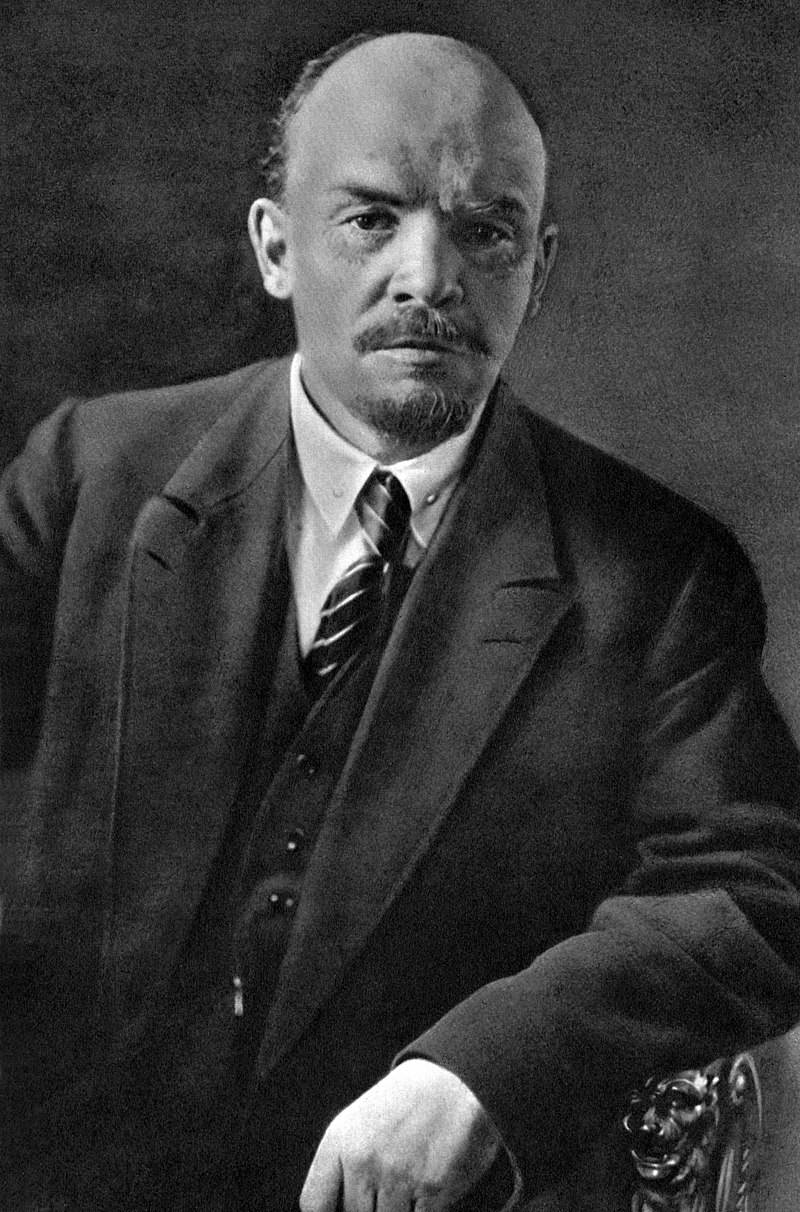 To the Russian revolutionary Vladimir Lenin, imperialism was the highest, but degenerate, stage of capitalism. 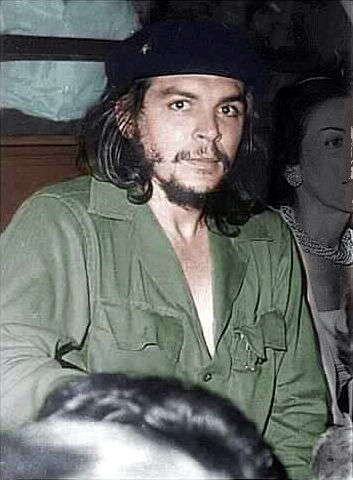 To the Latin American revolutionary Che Guevara, imperialism was a capitalistic geopolitical system of control and repression which must be understood as such in order to be defeated. In the mid-19th century, Karl Marx mentioned imperialism to be part of the prehistory of the capitalist mode of production in Das Kapital (1867–1894). Vladimir Lenin defined imperialism as "the highest stage of capitalism", the economic stage in which monopoly finance capital becomes the dominant application of capital.[35] As such, said financial and economic circumstances impelled national governments and private business corporations to worldwide competition for control of natural resources and human labour by means of colonialism.[36] The Leninist views of imperialism and related theories, such as dependency theory, address the economic dominance and exploitation of a country, rather than the military and the political dominance of a people, their country and its natural resources. Hence, the primary purpose of imperialism is economic exploitation, rather than mere control of either a country or of a region. The Marxist and the Leninist denotation thus differs from the usual political science denotation of imperialism as the direct control (intervention, occupation and rule) characteristic of colonial and neo-colonial empires as used in the realm of international relations.[37][36] In Imperialism, the Highest Stage of Capitalism (1917), Lenin outlined the five features of capitalist development that lead to imperialism: Concentration of production and capital leading to the dominance of national and multinational monopolies and cartels. Industrial capital as the dominant form of capital has been replaced by finance capital, with the industrial capitalists increasingly reliant on capital provided by monopolistic financial institutions. "Again and again, the final word in the development of banking is monopoly". The export of the aforementioned finance capital is emphasized over the export of goods. The economic division of the world by multinational cartels. The political division of the world into colonies by the great powers, in which the great powers monopolise investment.[38] Generally, the relationship among Marxist-Leninists and radical, left-wing organisations who are anti-war, often involves persuading such political activists to progress from pacifism to anti-imperialism—that is, to progress from the opposition of war, in general, to the condemnation of the capitalist economic system, in particular.[39] In the 20th century, the Soviet Union represented themselves as the foremost enemy of imperialism and thus politically and financially supported Third World revolutionary organisations who fought for national independence. This was accomplished through the export of both financial capital and Soviet military apparatuses, with the Soviet Union sending military advisors to Ethiopia, Angola, Egypt and Afghanistan. However, anarchists as well as many other Marxist organizations, have characterized Soviet foreign policy as imperialism and cited it as evidence that the philosophy of Marxism would not resolve and eliminate imperialism. Mao Zedong developed the theory that the Soviet Union was a social imperialist nation, a socialist people with tendencies to imperialism, an important aspect of Maoist analysis of the history of the Soviet Union.[40] Contemporarily, the term "anti-imperialism" is most commonly applied by Marxist-Leninists, and political organisations of like ideological persuasion who oppose capitalism, present a class analysis of society and the like.[41] About the nature of imperialism and how to oppose and defeat it, Che Guevara said: imperialism is a world system, the last stage of capitalism—and it must be defeated in a world confrontation. The strategic end of this struggle should be the destruction of imperialism. Our share, the responsibility of the exploited and underdeveloped of the world, is to eliminate the foundations of imperialism: our oppressed nations, from where they extract capitals, raw materials, technicians, and cheap labor, and to which they export new capitals—instruments of domination—arms and all kinds of articles; thus submerging us in an absolute dependence. — Che Guevara, Message to the Tricontinental, 1967[42] |
レーニン主義とマルクス・レーニン主義 ロシアの革命家ウラジーミル・レーニンにとって、帝国主義は資本主義の最も高い段階であり、しかし退廃した段階であった。  ラテンアメリカの革命家チェ・ゲバラにとって、帝国主義は資本主義の地政学的支配と弾圧の体制であり、これを理解しなければ打ち負かすことはできない。 19世紀半ば、カール・マルクスは『資本論』(1867年~1894年)において、帝国主義を資本主義的生産様式の前史の一部として言及した。ウラジーミ ル・レーニンは帝国主義を「資本主義の最高段階」と定義し、独占金融資本が資本の支配的な用途となる経済段階であるとした。[35] このような金融および経済状況により、各国政府と民間企業は、植民地主義によって天然資源と労働力の支配をめぐり世界規模の競争に駆り立てられることに なった。[36] 帝国主義に関するレーニン主義の見解や従属理論などの関連理論は、軍事的・政治的な優位性や、人民、その国、その天然資源の支配についてよりも、むしろ経 済的な優位性や搾取について論じている。したがって、帝国主義の主な目的は、単に国や地域を支配することではなく、経済的な搾取である。したがって、マル クス主義とレーニン主義の帝国主義の定義は、国際関係論の分野で使用されるような、植民地帝国や新植民地帝国に特徴的な直接的支配(介入、占領、支配)と しての政治学における通常の帝国主義の定義とは異なる。[37][36] 『帝国主義、資本主義の最高段階』(1917年)において、レーニンは帝国主義につながる資本主義の発展の5つの特徴を概説している。 生産と資本の集中が、国内および多国籍独占企業やカルテルの支配につながる。 資本の支配形態として、産業資本は金融資本に取って代わられ、産業資本家は独占的な金融機関が提供する資本にますます依存するようになった。「繰り返しになるが、銀行の発展における最終的な言葉は独占である」。 前述の金融資本の輸出は、商品の輸出よりも重視される。 多国籍カルテルによる世界の経済的分割。 大国による植民地化という政治的な世界分割、その中で大国が投資を独占する。[38] 一般的に、反戦主義のマルクス・レーニン主義者や急進左翼組織の間では、しばしばそのような政治活動家を説得して平和主義から反帝国主義へと進展させる、つまり、戦争一般への反対から、特に資本主義経済体制への非難へと進展させることが含まれる。[39] 20世紀において、ソビエト連邦は帝国主義の最大の敵であると自らを位置づけ、政治的・財政的に国家の独立のために戦う第三世界の革命組織を支援した。こ れは、金融資本とソビエトの軍事機構の両方の輸出を通じて達成され、ソビエト連邦はエチオピア、アンゴラ、エジプト、アフガニスタンに軍事顧問団を派遣し た。 しかし、無政府主義者や他の多くのマルクス主義組織は、ソビエトの外交政策を帝国主義と特徴づけ、マルクス主義の哲学では帝国主義を解決し排除できないと いう証拠としてそれを挙げた。毛沢東は、ソビエト連邦は社会帝国主義国家であり、社会主義者でありながら帝国主義の傾向を持つという理論を展開した。これ は、ソビエト連邦の歴史に対する毛沢東主義的分析の重要な側面である。[40] 現在、「反帝国主義」という用語は、マルクス・レーニン主義者や、資本主義に反対する同様のイデオロギー的信念を持つ政治組織によって最も一般的に使用さ れている。社会の階級分析などを提示している。[41] 帝国主義の本質と、それに対抗し打ち負かす方法について、チェ・ゲバラは次のように述べている。 帝国主義は世界システムであり、資本主義の最終段階である。そして、世界的な対決によって打ち負かさなければならない。この闘争の戦略的目的は、帝国主義 の破壊でなければならない。我々、つまり世界の被搾取・低開発地域の責任は、帝国主義の基盤を排除することである。すなわち、彼らが資本、原材料、技術 者、安価な労働力を搾取する我々の抑圧された国々を排除し、そこへ新たな資本、すなわち支配の道具、武器、あらゆる種類の物品を輸出することによって、我 々を絶対的な依存状態に陥れることである。 — チェ・ゲバラ、1967年『三極大陸へのメッセージ』[42] |
| Trotskyism The concept of permanent war economy originated in 1945 with an article by Trotskyist[43] Ed Sard (alias Frank Demby, Walter S. Oakes and T.N. Vance), a theoretician who predicted a post-war arms race. He argued at the time that the United States would retain the character of a war economy; even in peacetime, US military expenditure would remain large, reducing the percentage of unemployed compared to the 1930s. He extended this analysis in 1950 and 1951.[44] The concept has been a core tenet of the British Socialist Workers Party with founder, Tony Cliff, examining its application to the First World War, American imperialism and colonial empires including Britain, France and Germany.[45] |
トロツキズム 恒久戦争経済という概念は、戦後の軍拡競争を予測した理論家であるトロツキストのエド・サード(別名フランク・デンビー、ウォルター・S・オークス、T・ N・ヴァンス)による1945年の論文に端を発する。彼は当時、米国は戦争経済の性格を維持し続けるだろうと主張した。たとえ平和時であっても、米国の軍 事支出は多額のままとなり、1930年代と比較して失業率は低く抑えられるだろうと。彼は1950年と1951年にこの分析をさらに発展させた。[44] この概念は、トニー・クリフが創設したイギリス社会労働党の主要な信条であり、第一次世界大戦、アメリカ帝国主義、イギリス、フランス、ドイツを含む植民地帝国への適用を検証している。[45] |
| Opposition to Soviet imperialism See also: Soviet empire, Anti-Sovietism, and Social imperialism 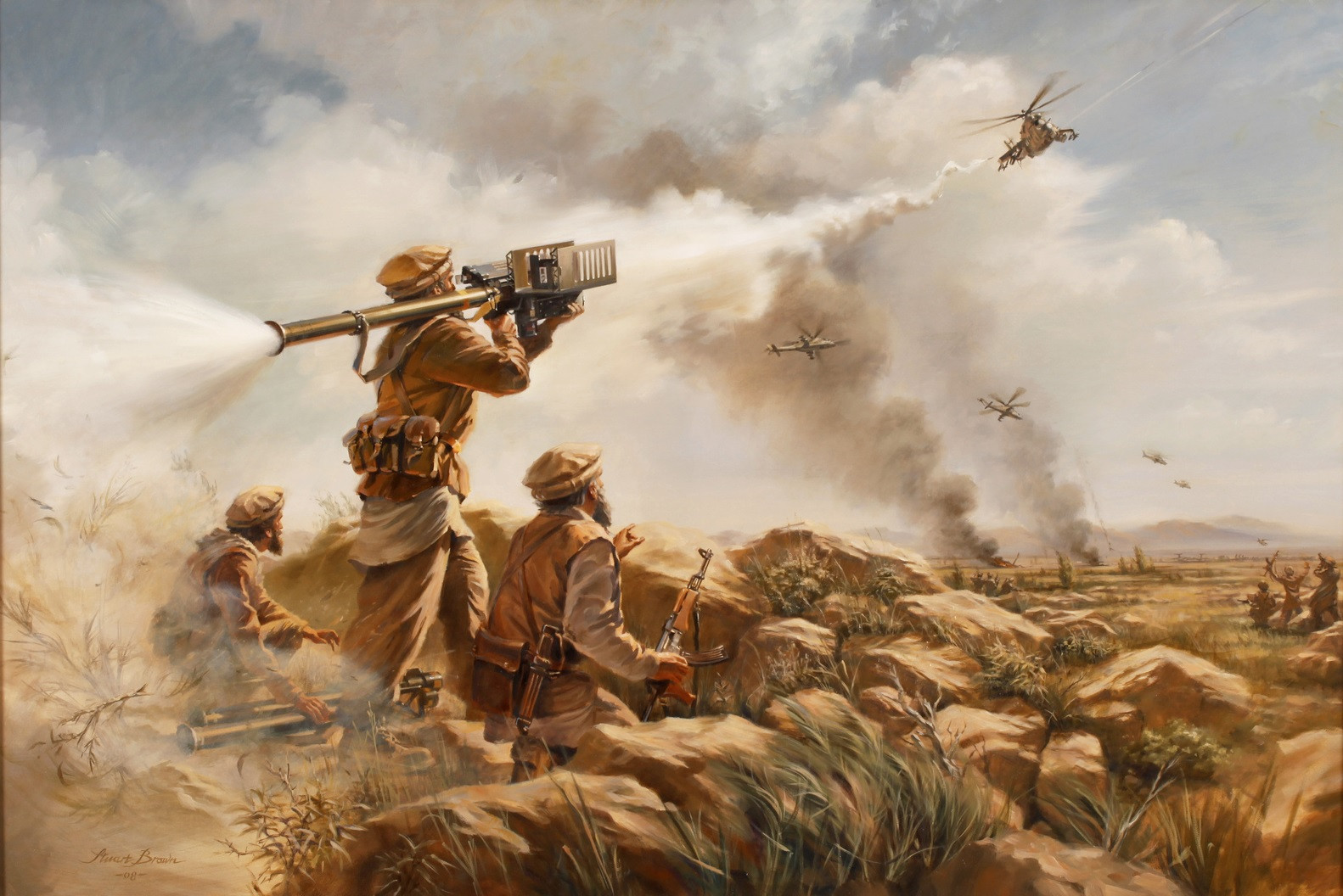 Depiction of the first shoot-down of Soviet helicopter gunships by the Afghan mujahideen using Western-supplied Stinger Missiles, widely regarded as the turning point in the Soviet-Afghan War The nations which were part of the Soviet sphere of influence were nominally independent countries with separate governments that set their own policies, but those policies had to stay within certain limits decided by the Soviet Union. These limits were enforced by the threat of intervention by Soviet forces, and later the Warsaw Pact. Major military invasions took place in East Germany in 1953, Hungary in 1956, Czechoslovakia in 1968 and Afghanistan from 1979 to 1989. Countries in the Soviet Bloc were considered satellite states. The Soviet Union exhibited tendencies common to historic empires.[46][47] The notion of "Soviet empire" often refers to a form of "classic" or "colonial" empire with communism only replacing conventional imperial ideologies such as Christianity or monarchy, rather than creating a revolutionary state. Academically the idea is seen as emerging with Richard Pipes' 1957 book The Formation of the Soviet Union: Communism and Nationalism, 1917–1923, but it has been reinforced, along with several other views, in continuing scholarship.[48]: 41 Several scholars hold that the Soviet Union was a hybrid entity containing elements common to both multinational empires and nation states.[46] The Soviet Union practiced colonialism similar to conventional imperial powers.[47][49][50][51][52][53][54] |
ソビエト帝国主義への反対 関連項目:ソビエト帝国、反ソビエト主義、社会帝国主義  アフガニスタンのムジャーヒディーンが西側から供給されたスティンガー・ミサイルを使用してソ連軍の攻撃ヘリコプターを初めて撃墜した様子を描いた絵画。これはソ連・アフガン戦争における転換点と広く考えられている ソ連の影響下にあった国々は、名目上は独自の政策を定める政府を持つ独立国であったが、それらの政策はソ連が決定した一定の制限の範囲内に留まらなければ ならなかった。これらの制限は、ソ連軍、後にワルシャワ条約機構軍による介入の脅威によって強制された。主な軍事侵攻は、1953年の東ドイツ、1956 年のハンガリー、1968年のチェコスロバキア、1979年から1989年のアフガニスタンで起こった。ソ連圏の国々は衛星国とみなされていた。 ソビエト連邦は歴史上の帝国に共通する傾向を示していた。[46][47] 「ソビエト帝国」という概念は、革命的な国家を創り出すのではなく、キリスト教や君主制といった従来の帝国のイデオロギーを共産主義に置き換えただけの 「古典的」あるいは「植民地的」帝国の形態を指すことが多い。学術的には、リチャード・パイプスの1957年の著書『ソビエト連邦の形成: 共産主義とナショナリズム、1917年~1923年』が契機となっているが、この考え方は、他のいくつかの見解とともに、継続的な研究の中で強化されてき た。[48]:41 複数の学者は、ソビエト連邦は多国籍帝国と国民国家の両方に共通する要素を含むハイブリッドな存在であったと主張している。[46] ソビエト連邦は、従来の帝国諸国と同様の植民地主義を実践していた。[47][49][50][51][52][53][54] |
| Islamic anti-imperialism See also: Pan-Islamism and Islamism 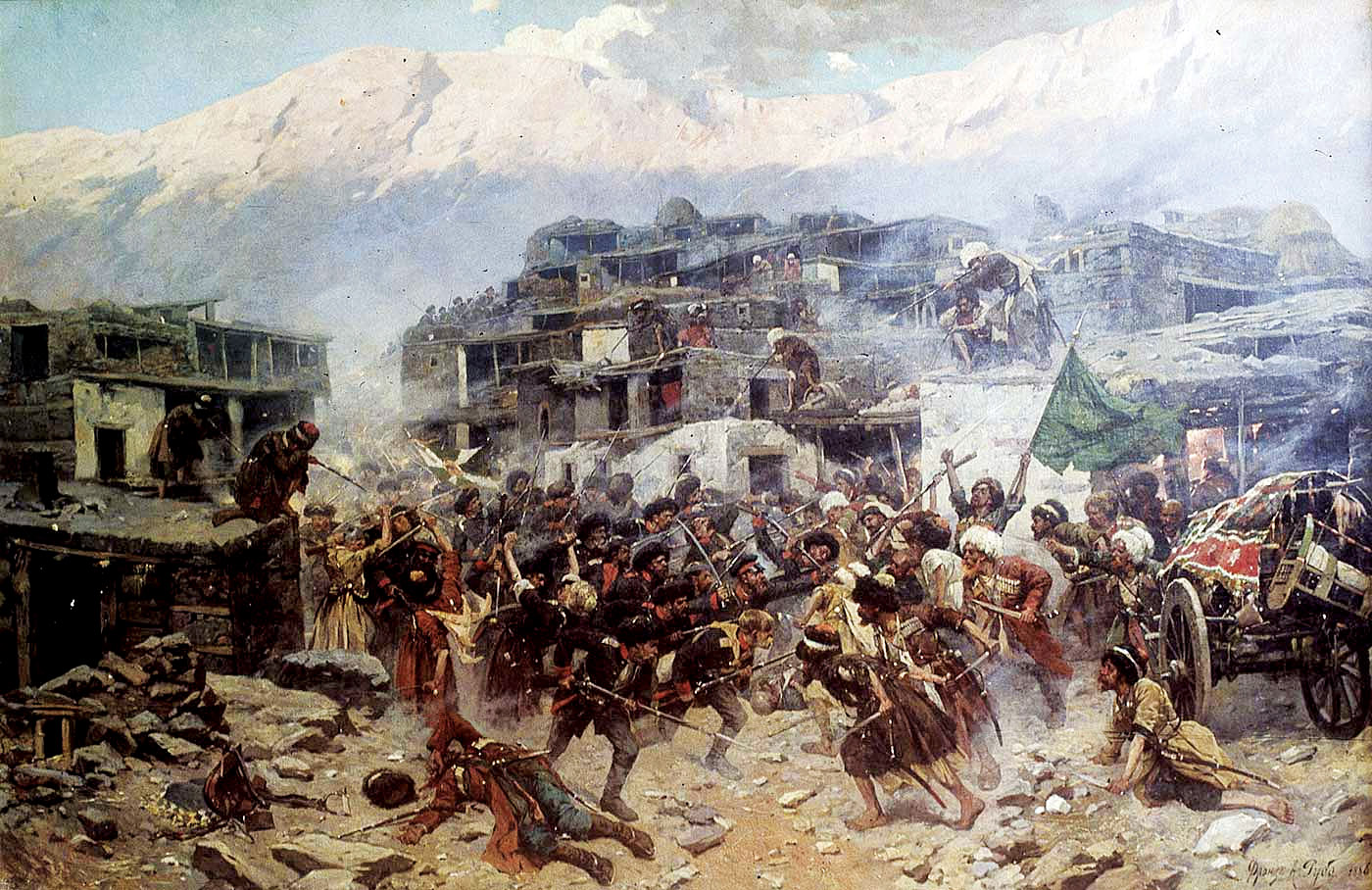 Resistance fighters of Caucasian Mujahidin defend the village of Salta from the invading Russian Imperial Army during the Caucasian War. The 18th and 19th centuries witnessed the rise of numerous anti-colonial and anti-imperial Islamic resistance movements across various parts of the Muslim World. These included the jihad movement led by the Imamate of Caucasus and the Circassian Confederacy against Russian imperialism during the Caucasus Wars (1763–1864 CE). Prominent leaders in this resistance campaign included Ghazi Mullah, Hamzat Bek, Shamil, Hajji Qerandiqo Berzeg, Jembulat Boletoqo, etc. Other major anti-imperial movements included the Padri War, Java War, and the Aceh War against the Dutch colonisation of Indonesia, Moro Rebellion against the United States, the South Asian Jihad movement of Sayyid Ahmad Shahid, Mahdist State in Sudan and the Arabian Muwahhidun that fought British colonialism, Emir Abd al-Qadir's military insurgency against French in Algeria, North-West Frontier Uprisings of the Pashtun tribes against the British Raj, Omar Mukhtar's Jihad against Italian Fascists in Libya, etc. The establishment and defense of Islamic statehood that enforces Sharia (Islamic law) based on Qur'an and Sunnah, elimination of superstitions and heterodox local practices and folk rituals, etc. were key objectives of these reform movements.[55] 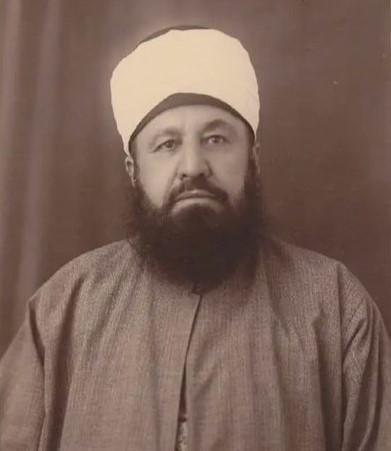 Imam Muhammad Rashid Rida was an ardent advocate of Pan-Islamist insurgency against imperialism. His teachings inspired figures like Hasan al-Banna, Sayyid Qutb and Abdullah Azzam. These anti-colonial movements inspired the rise of Pan-Islamism during the late 19th century; which gave birth to numerous Islamist organisations advocating anti-imperialism across the Muslim World; such as the Muslim Brotherhood (Ikhwan al-Muslimeen) and Jamaat-e-Islami.[56] Syro-Egyptian Islamist theoretician Muhammad Rashid Rida (1865 CE/1282 AH–1935 CE/1354 AH), a Salafi theologian greatly influenced by preceding militant Islamic revivalist movements, was an ardent opponent of European imperial powers; and he called for armed jihad to defend the Islamic World from encroaching colonialism, complemented by a political programme to establish Islamic states which would implement Sharia (Islamic laws). He extended this anti-imperialist campaign to the theological level through the Arab Salafiyya movement; which professed the key theme of returning to the values of Salaf al-Salih. This encompassed a theological assault on Western ideological currents emanating from the principles of secularism and nationalism as well as denunciation of Western cultural imperialism.[57][58] After Rashid Rida, the mantle of Islamist anti-imperialism was spearheaded by the Egyptian Muslim Brotherhood founder Hasan al-Banna, South Asian revolutionary Islamist leader Sayyid Abul A'la Maududi and Egyptian Jihadist theoretician Sayyid Qutb. Mawdudi held the belief that West was in decline and that restoration of Islamic prowess was inevitable. Openly equating Western colonialism with atheism, Mawdudi called upon Muslims to rally in jihad against the imperialist forces to regain their spiritual, cultural, economic and military sovereignty and self-sufficiency. Sayyid Qutb, an Egyptian scholar influenced by both Mawdudi and Rashid Rida, took their ideas to its logical culmination; proclaiming the necessity of a permanent, un-ending Islamist revolution not only against the imperialists but also its allied regimes in the Muslim World. This revolution against the apostate regimes has to be waged as an armed jihad by an ideological vanguard committed to establish the Islamic state and uphold Tawhid (Islamic monotheism). These ideas gained prominence and arose in influence across the Islamic World during the post-World War II era. During the Cold War period, the Islamist intellectuals from the Muslim Brotherhood and Jamaat-e Islami also launched fervent anti-communist campaigns, ideologically critiquing socialism and Marxism and chiding leftists as agents of Soviet Imperialism.[59] 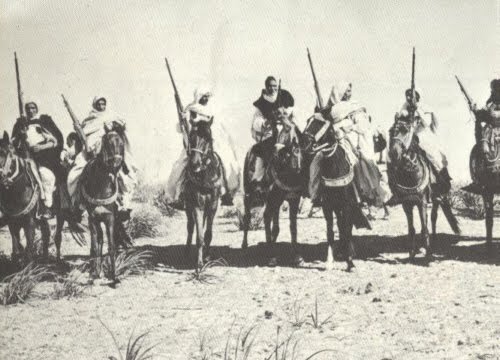 Islamic commander Omar Mukhtar, popularly known as the "Lion of the Desert", led the Libyan Mujahidin against the imperialist forces of Fascist Italy during the Interwar Period. In his book "Al Jihad Fil Islam", South Asian revolutionary Islamist scholar Abul A'la Mawdudi made a comprehensive religious refutation of imperialism. He argued that oppressive rulers justify imperialism in the name of progress and socio-political reforms. Describing the main features of imperialism, Mawdudi wrote: "the basic quality of imperialism is the dominance of one particular nation or country... Thus, the doors of imperialism remain closed to people of other nationalities and for this reason, they can play no major role in running its affairs. This gives rise to the development of other faults in the system and characters of the subject nation. They develop a weakness of character, lose self-esteem and the sense of righteousness. Even if the ruling nation does not treat the subjects with outright cruelty and arrogance, their (the subject nation’s) character sinks to such a low ebb of ignobility that they become quite incapable of striving for attaining and maintaining self-rule for a very long time." — Abul A'la Maududi, Al Jihad fil Islam, [60] 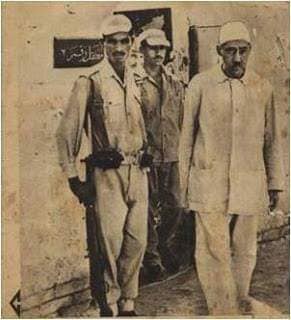 According to the Egyptian Jihadist theoretician Sayyid Qutb, the imperialism of secular Western powers was a by-product of their historical Crusading spirit and driven by ideological differences. The Indian Jamaat-e-Islami Hind launched a ten-day nationwide campaign titled Anti-Imperialism Campaign in December 2009.[61] Contemporary Jihadist movements such as Al-Qaeda, influenced by Sayyid Qutb's thought, declares itself as a "global revolutionary vanguard" waging jihad to defend Muslims from atrocities committed by the forces of Western imperialism and its allies.[62] In the worldview of Egyptian Jihadist theoretician Sayyid Qutb, imperialist policies of the secular Western regimes were a continuation of their historical "Crusading Spirit".[63] In his commentary of the Qur'anic verse 2:120 "{Never will the Jews be pleased with you, (O Prophet), nor the Christians until you follow their way..}", Sayyid Qutb writes: "The conflict between the Judeo-Christian world on the one side, and the Muslim community on the other, remains in essence one of ideology, although over the years it has appeared in various guises and has grown more sophisticated and, at times, more insidious. We have seen the original ideological conflict succeeded by economic, political and military confrontation, on the basis that 'religious' or 'ideological' conflicts are outdated and are usually prosecuted by 'fanatics' and backward people. Unfortunately, some naïve and confused Muslims have fallen for this stratagem and persuaded themselves that the religious and ideological aspects of the conflict are no longer relevant. But in reality world Zionism and Christian Imperialism, as well as world Communism, are conducting the fight against Islam and the Muslim community, first and foremost, on ideological grounds... The confrontation is not over control of territory or economic resources, or for military domination. If we believe that, we would play into our enemies’ hands and would have no one but ourselves to blame for the consequences." — Sayyid Qutb, Fi Zilal al-Quran, [64] |
イスラム教の反帝国主義 関連項目: 汎イスラム主義とイスラム主義  コーカサス・ムジャーヒディーンの抵抗勢力が、コーカサス戦争中にロシア帝国の侵略軍からサルタ村を守る。 18世紀と19世紀には、イスラム世界のさまざまな地域で、多数の反植民地・反帝国主義のイスラム抵抗運動が勃興した。これには、コーカサス戦争(西暦 1763年~1864年)における、コーカサス首長国とカフカス連合による、ロシア帝国に対するジハード運動も含まれている。この抵抗運動の著名な指導者 には、ガージ・ムッラー、ハムザト・ベク、シャミール、ハッジ・ケランディコ・ベルゼグ、ジェンブラット・ボレトコなどがいた。 その他の主な反帝国主義運動には、インドネシアのオランダ植民地化に対するパドリー戦争、ジャワ戦争、アチェ戦争、米国に対するモロ反乱、サイイド・アフ マド・シャヒードの南アジア聖戦運動、スーダンのマフディー国家、英国の植民地主義と戦ったアラビア・ム 英国の植民地主義と戦ったワッハーブ派、アルジェリアにおける首長アブド・アル・カディルのフランス軍に対する軍事蜂起、英領インドに対するパシュトゥー ン族の北西辺境一揆、リビアにおけるイタリアのファシストに対するオマル・ムフタールのジハードなどである。コーランとスンナに基づくシャリーア(イスラ ム法)を施行するイスラム国家の樹立と防衛、迷信や異端的な地域慣習や民間儀式の排除などが、これらの改革運動の主要な目的であった。[55]  イマームのムハンマド・ラシード・リダは、帝国主義に対する汎イスラム主義の蜂起の熱烈な提唱者であった。彼の教えは、ハサン・アル・バンナ、サイイド・クトゥブ、アブドゥッラー・アッザームといった人物に影響を与えた。 これらの反植民地主義運動は、19世紀後半に汎イスラム主義の台頭を促した。汎イスラム主義は、イスラム世界全体に反帝国主義を唱える数多くのイスラム主 義組織を生み出した。例えば、ムスリム同胞団(Ikhwan al-Muslimeen)やジャマーア・イスラミ(Jamaat-e-Islami)などである。シリア系エジプト人のイスラム主義理論家ムハンマド・ ラシード・リダ(1 865年 - 1935年)は、先立つイスラム復興運動の急進派から多大な影響を受けたサラフィ主義神学者であり、ヨーロッパの帝国主義の強硬な反対者であった。彼は、 イスラム世界を侵食する植民地主義から守るために聖戦を呼びかけ、シャリーア(イスラム法)を施行するイスラム国家を樹立するための政治プログラムを補完 した。彼は、この反帝国主義運動を神学的なレベルにまで拡大し、アラブ・サラフィヤ運動を通じて、サラフ・アル=サレーの価値観への回帰という主要テーマ を掲げた。これは、世俗主義と民族主義の原則から生じる西洋のイデオロギー的潮流に対する神学的攻撃、および西洋の文化的帝国主義の非難を含んでいた。 [57][58] ラシード・リダの死後、イスラム教徒の反帝国主義運動は、エジプトのムスリム同胞団の創設者ハサン・アル=バンナ、南アジアのイスラム革命指導者サイイ ド・アブドゥル・アライ・マウドゥディ、エジプトの聖戦理論家サイイド・クトゥブが先導した。マウドゥディは、西洋は衰退しつつあり、イスラムの復権は不 可避であるという信念を抱いていた。西洋の植民地主義を無神論と公然と同一視したマウドゥディは、イスラム教徒たちに帝国主義勢力に対するジハードに結集 し、精神的、文化的、経済的、軍事的独立と自給自足を取り戻すよう呼びかけた。サイイド・クトゥブは、マウドゥディとラシード・リダの両者に影響を受けた エジプトの学者であり、彼らの考えを論理的に集大成した。すなわち、帝国主義者だけでなく、イスラム圏の同盟政権に対しても、永続的で終わりのないイスラ ム主義革命が必要であると宣言した。背教者政権に対するこの革命は、イスラム国家を樹立し、タウヒード(イスラム教の一神教)を擁護することを使命とする 思想的前衛部隊が、武力によるジハードとして戦わなければならない。これらの考え方は、第二次世界大戦後の時代にイスラム世界で注目を集め、影響力を強め た。冷戦時代には、ムスリム同胞団やジャマーテ・イスラミのイスラム主義知識人たちも熱烈な反共産主義キャンペーンを展開し、社会主義やマルクス主義を思 想的に批判し、左派をソビエト帝国主義の手先と非難した。  「砂漠の獅子」として一般に知られるイスラム教司令官オマル・ムフタールは、戦間期にファシスト・イタリアの帝国主義勢力に対してリビアの聖戦士たちを率いた。 南アジアの革命的イスラム学者アブル・アラー・マウドゥディは著書『聖戦はイスラムにある』で、帝国主義に対する包括的な宗教的反論を行った。彼は、抑圧 的な支配者は進歩や社会政治改革の名のもとに帝国主義を正当化していると論じた。マウドゥディは帝国主義の主な特徴を次のように述べている。 「帝国主義の基本的な性質は、特定の国家または国による支配である。したがって、帝国主義の門戸は他の国籍の人々に対しては閉ざされたままであり、この理 由から、彼らはその運営において大きな役割を果たすことはできない。これは、支配を受ける国家の体制や性格に、他の欠陥が生じる原因となる。彼らは人格的 に弱くなり、自尊心や正義感を失う。たとえ支配国が被支配国に対して露骨な残酷さや傲慢さを見せなくても、被支配国の性格は卑しさにどん底まで落ち込み、 彼らは長い間、自治の達成と維持のために努力することがまったくできなくなる。 — アブル・アラー・マウドゥディ著『イスラムにおける聖戦』[60]  エジプトの聖戦論者サイイド・クトゥブによると、世俗的な西洋諸国の帝国主義は、彼らの歴史的な十字軍精神の副産物であり、イデオロギーの違いによって推進されたものである。 インドのジャマーテ・イスラミ・ヒンドは、2009年12月に「反帝国主義キャンペーン」と題した10日間の全国キャンペーンを開始した。[61] アルカイダのような現代の聖戦運動は、サイイド・クトゥブの思想に影響を受け、自らを「世界的な革命的前衛」と称し、西洋の帝国主義とその同盟国による残 虐行為からイスラム教徒を守るために聖戦を戦っていると宣言している。[62] エジプトの聖戦理論家サイイド・クトゥブの世界観では、世俗的な西洋諸国の帝国主義政策は、彼らの歴史的な「十字軍精神」の継続である。[63] クルアーン第2章120節「{預言者よ、あなたが彼らのやり方に従うまで、ユダヤ人もキリスト教徒もあなたに満足することはないだろう。}」の注釈で、サ イイド・クトゥブは次のように書いている。 「ユダヤ・キリスト教世界とイスラム教社会との間の対立は、本質的にはイデオロギー上の対立であり、長年にわたってさまざまな形をとって現れ、より巧妙 に、時にはより陰湿になってきているが、本質的にはイデオロギー上の対立である。我々は、当初のイデオロギー上の対立が、経済、政治、軍事上の対立へと引 き継がれていくのを目の当たりにしてきた。「宗教」や「イデオロギー」上の対立は時代遅れであり、通常は「狂信者」や「後進的な人々」によって行われると いう理由からである。残念ながら、一部のナイーブで混乱したイスラム教徒は、この策略に引っかかり、紛争の宗教的・イデオロギー的な側面はもはや関係ない と思い込んでしまった。しかし実際には、世界シオニズムやキリスト教帝国主義、さらには世界共産主義は、何よりもまずイデオロギー的な理由から、イスラム 教とイスラム教徒社会に対する闘争を続けているのだ。この対立は、領土や経済資源の支配、あるいは軍事的支配をめぐるものではない。もしそう信じているの であれば、それは敵の思うつぼであり、その結果に対しては自分自身を責める以外にないだろう。 — サイイド・クトゥブ著『クルアーンの解釈』[64] |
| Liberal anti-imperialism There have also been many examples of liberal anti-imperialism. However, liberal anti-imperialists are distinct from socialist anti-imperialists because they do not support anti-capitalism.[65] South Korean liberals have opposed Chinese and Japanese imperialism. "No Japan Movement" is related to anti-imperialist sentiment in South Korea. On August 14, 2019, seven politicians of the DPK's descendants of independence activists said at a press conference, "In the spirit of Great Korean Independence 100 years ago, let's overcome the economic invasion of Shinzo Abe's government." (100년 전 대한독립의 정신으로 아베 정부 경제침략을 이겨내자.)[66] South Korean liberals, unlike protectionist anti-imperialists, believing that the Japanese government's actions that undermined the "free trade principle" (자유무역 원칙 or 자유무역 철칙) during the Japan–South Korea trade dispute were far-right imperialist 'economic invasion'. (South Korean liberals argue that the Japanese government caused unfair damage to the South Korean economy to avoid compensation for Korean victims of Japanese war crimes during the past imperialist Japan.)[65] South Korean liberals also oppose the appropriation of Korean culture of the Chinese people.[67] Some modern liberals in the United States, including Dennis Kucinich, support non-interventionism.[citation needed] |
リベラル反帝国主義 リベラル反帝国主義の例も数多くある。しかし、リベラル反帝国主義者は反資本主義を支持しないため、社会主義反帝国主義者とは異なる。[65] 韓国のリベラル派は、中国と日本の帝国主義に反対してきた。「ノー・ジャパン・ムーブメント」は、韓国における反帝国主義感情と関連している。2019年 8月14日、民主党の独立運動家の子孫である7人の政治家が記者会見で、「100年前の大韓独立の精神で、安倍晋三政権の経済侵略を克服しよう」と述べ た。(100년 전 대한독립의 정신으로 아베 정부 경제침략을 이겨내자.)[66] 韓国の 自由貿易の原則」(자유무역 원칙または자유무역 철칙)を損なう日本政府の行動は、保護貿易主義的な反帝国主義者とは異なり、極右の帝国主義による「経済侵略」であると信じている。(韓国のリベラル派 は、過去の帝国主義日本による韓国人戦争犯罪被害者への賠償を避けるために、日本政府が韓国経済に不当な損害を与えたと主張している)[65] 。韓国のリベラル派はまた、中国の人々による韓国文化の流用にも反対している[67]。 米国の一部の現代のリベラル派、例えばデニス・クシニッチなどは、不干渉主義を支持している[要出典]。 |
| Criticism Antonio Negri and Michael Hardt assert that traditional anti-imperialism is no longer relevant. In the book Empire,[68] Negri and Hardt argue that imperialism is no longer the practice or domain of any one nation or state. Rather, they claim, the "Empire" is a conglomeration of all states, nations, corporations, media, popular and intellectual culture and so forth; and thus, traditional anti-imperialist methods and strategies can no longer be applied against them.[citation needed] The Estonian political scientist Maria Mälksoo argues that "one of many blind spots" in postcolonial studies linked to anti-imperialist movements is that they often ignore Russian imperialism and colonialism.[69] |
批判 アントニオ・ネグリとマイケル・ハートは、従来の反帝国主義はもはや適切ではないと主張している。著書『帝国』[68]において、ネグリとハートは、帝国 主義はもはや特定の国家や政府の実践や領域ではないと論じている。むしろ、「帝国」とは、すべての国家、国家、企業、メディア、大衆文化や知的文化などの 集合体であると主張している。したがって、伝統的な反帝国主義の方法や戦略は、もはやそれらに対して適用することはできない。 エストニアの政治学者マリア・マールクソは、反帝国主義運動と関連するポストコロニアル研究における「多くの盲点のひとつ」として、ロシア帝国主義と植民地主義を無視することが多いことを挙げている。[69] |
| Anti-Americanism Anti-British sentiment Anti-French sentiment Anti-Western sentiment Colonialism Decentralization Historiography of the British Empire Indigenism Indigenismo Internationalism (politics) Irish nationalism (Irish republicanism) Korean nationalism Anti-Chinese sentiment in Korea Anti-Japanese sentiment in Korea League against Imperialism Left-wing nationalism Localism (politics) National liberation wars National self-determination Postcolonialism |
反米主義 反英感情 反仏感情 反米感情 植民地主義 地方分権 大英帝国の歴史 土着主義 土着主義 国際主義(政治) アイルランド民族主義(アイルランド共和主義) 韓国民族主義 韓国における反中感情 韓国における反日感情 帝国主義反対同盟 左翼民族主義 地域主義(政治) 民族解放戦争 民族自決 ポストコロニアリズム |
| https://en.wikipedia.org/wiki/Anti-imperialism |
|
リ ンク
文 献
そ の他の情報
Copyleft, CC, Mitzub'ixi Quq Chi'j, 1996-2099
☆
 ☆
☆